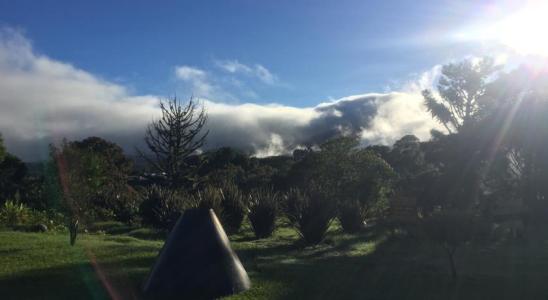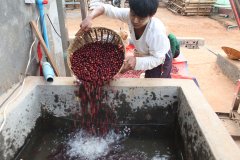The most romantic cafe in France introduces what is the cultural connotation of the famous cafe in France
For professional baristas, please follow the coffee workshop (Wechat official account cafe_style)
Since the emergence of the first cafe in France in the second half of the 17th century, the country has developed a close cultural relationship with the cafe. The thinkers of the age of enlightenment debated or wrote books here, and finally sparked the flames of the French Revolution. At that time, the cafe was full of strong political atmosphere. At the beginning of the 19th century, artists and writers almost used cafes as their offices. in order to save electricity and money, they often ordered one or two cups of coffee to sit for the whole day, or used it as a meeting place for exchange of views and news, with their own territory or seats. in turn, the cafe has become a stronghold of some gang, with more romantic and unruly vitality.
Boco Cafe-the dark blue appearance gives the cafe, which opened in 1686, a calm temperament. It is the oldest restaurant in Paris and is said to be the first cafe in the world. In addition to politicians and scholars, many actors often linger here because of the establishment of the French Theater. Celebrity portraits in the window and interior illustrate the store's glorious past; Voltaire and Diderot write an encyclopedia here, and Rousseau and Franklin are also regulars.

Hua Shen Cafe-founded in 1887, Hua Shen Cafe is simply a history of French humanistic thought and art. The first to blossom here were the surrealist poets, and Apolinay became the most representative figure; during the German occupation, it became a place for Simon Bova and Saudi Arabia to keep warm; Juliet Gregor, Alain Delon, Zhenfonda and Brigitte Badu, who sang pop music at that time after the war, made the place even more shining. Since 1994, the Flower God Literature Award created here has not only ranked among the important literary awards in France, but also become a symbol of the humanities and history of this cafe. Today, the cafe, located on the opposite corner of St. Germain's Cathedral, still offers visitors unlimited imagination with its green cups and plates on a white background.
Important Notice :
前街咖啡 FrontStreet Coffee has moved to new addredd:
FrontStreet Coffee Address: 315,Donghua East Road,GuangZhou
Tel:020 38364473
- Prev

Coffee shops generally have several types of coffee shops, individual coffee shops and residential coffee shops.
Professional barista communication Please follow the coffee workshop (Wechat official account cafe_style) to open a coffee shop. I believe it is a dream that many people have had since childhood, but as they get older, I believe there are many people who will no longer pursue such a simple dream. With the rise of entrepreneurship in recent years, the dream of opening a coffee shop has been dug up by many people from their childhood dreams.
- Next

The professional knowledge that baristas must master how to choose coffee beans at the cafe bar
Communication of professional baristas Please pay attention to Coffee Workshop (Wechat official account cafe_style) Coffee is one of the favorite drinks of many people, and the changes in diversity also make it attractive. There are all kinds of coffee all over the world, each of which has different taste and flavor. If the carefully brewed coffee is different from your own preferences, no matter how good the coffee will be.
Related
- What documents do you need to go through to open a coffee shop? coffee shop coffee shop certificate processing process
- How to purchase Coffee beans in small Cafe how to choose a suitable supplier for domestic Coffee supply Company
- How to drink Starbucks Fragrance White Coffee? how to make Australian White Coffee? what Italian coffee beans are recommended?
- The Story of Flora Coffee: the name of Flora Coffee Bean and the implication of the Flowers on Florna Coffee
- How much does a cup of coffee cost? How much is the profit of a cup of coffee? What is the profit of the coffee shop in a year?
- Yunnan small Coffee, known as "fragrant Coffee", introduces the characteristics of Alpine Arabica Coffee producing areas in Yunnan, China
- 2023 latest Starbucks full menu price list how much is a cup of Starbucks coffee what is better to drink the most popular hot and cold drinks recommended
- Starbucks different kinds of Coffee Price list Starbucks menu 2023 Top Ten Best drinks in Starbucks
- Starbucks Spring praise Comprehensive matching Coffee Bean theme Story Packaging implication and taste description
- The cost of a cup of coffee latte American coffee cost price and selling price

